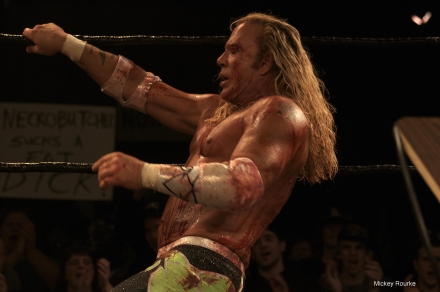What happens when a film nerd's occasional foreign film and horror forays mix?
Uh, apparently this:

That's
Frontière(s), a 2008 French movie (pretty much unreleased in the U.S.) whose title translates into English as: "Gee, what do you suppose 'frontiere(s)' means?" The setup is pretty standard (a near rip-off of my all-time favorite pure horror entry, the original
Texas Chain Saw Massacre): Group of kids/twentysomethings ends up at house (in this case, hotel) in remote area, but runners of said hotel/house aren't your typical farmers*.
*Our protagonists can only *wish* these people were lead farmers.So, you say, if the film's plot is so derivative, why are you writing about it?
I'm glad you asked.
It's not so much that writer-director
Xavier Gens knows what he's doing, although he clearly does -- creating some beautiful (and beautifully awful) images (even if some of them are borrowed from other places, like a scene where two characters push their way through a cave-like tunnel ... hello,
The Descent). It's not the film's excruciating violence/gore, which is considerable but rarely to the point of excess (unlike
Hostel and its torture-porn counterparts). And it's not how frustratingly unrealistic the last act is (where the main character, a three-months-pregnant girl who has been near-brutalized for hours, suddenly starts kicking ass).
Mostly, it's how confounding the film's message -- and yes, it has one -- is.
Frontière(s) starts not on the farm but in Paris, during race riots (the quartet of main characters are of Muslim descent). We learn an extreme right-wing government is about to win the next election -- and hello, fascism! Meanwhile, the protags have pulled off a heist of some kind, are wanted by the cops, and are getting the eff out of Dodge (Dodge here meaning France).
So they wind up at that hotel to spend the night in hiding, but its owners aren't the stereotypical American in-bred hillbilly types. The patriarch is an ex-Nazi. He wants a pure-blooded race, at least in his home. He drafts the female of the group (played quite well by
Karina Testa) as the family's next "mother." And you can imagine what happens to her male friends.
Now,
critics have inferred and
Gens himself has said that the film is meant to be symbolic, an allegory on the importance of human rights. To which I say: Yawn. Not that human rights are, like, ya know, a *bad* thing. But as a movie message, the whole government-spreading-hate bit has been played for a long, long time*. Sure, it's easy for me to say as I'm not a member of any oppressed group, but I just can't connect with the same theme again, and again, and again, and again ...
*Which, as an aside, is part of what made Children of Men such an overrated bore, despite the incredible filmmaking involved. Honestly, it's great that you're against hate and tyranny, but please don't insult my intelligence with an obvious, inarguable message. You mean penning people up like hogs is a bad thing? Golly! I** didn't know that! Thanks! Next, you should make a movie explaining that the world is round!
**And before you come at me with, "Yeah, but not *everyone* believes in the evil of tyranny," let me ask: If someone believes otherwise, do you really think a two-hour sci-fi or horror flick (with zero subtlety, no less) is going to change their minds? Really? Good luck with that.
What's interesting about
Frontière(s), though, is after some personal reflection, I saw the film's message as much different, and there's a very, very late scene that sums it up perfectly (no giving it away, though, since it's SPOILER-tastic). Basically, the movie seemed to be a commentary on how we view human rights in the 21st Century: Sure, the Bush-era panic/constraints felt scary (to many, at least), but words like "Nazi" and "fascist" and "gulag" were (and, I suppose, still are) thrown around like superfluous adjectives, overused terms that lose their meaning almost instantly.
Frontière(s) shows us what a *real* gulag is, who the *real* Nazis are. Think a little wiretapping is bad? You ain't seen nothin' yet.
Whether that's a healthy message is debatable, depending on your political bent. I'm not here to argue that. My point is: At least it's different, and I like different in my movies.
Now, was it Gens' intent? Probably not, according to that above interview. But if it wasn't -- oops, he messed up.
Who says movies where people hang lifeless on meathooks can't spark discussion?
 (EW.com w/the pic ... and a bad review that spends way too much time talking about something that doesn't really matter in this movie ...)
(EW.com w/the pic ... and a bad review that spends way too much time talking about something that doesn't really matter in this movie ...)









